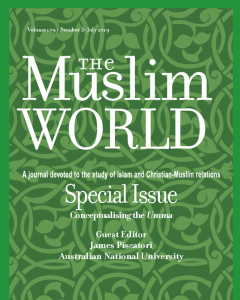
Abstract
Muslim societies, like all others, are inexorably interconnected with cultural exchanges, intimate political interactions and a degree of economic interdependence.2 Building on historical precedents, ‘Islam’ has seemed naturally cosmopolitan. Over time Muslims have developed a sense of interconnectedness, even an idealisation of unity, as seemingly contradictory trends unfolded – as states and parochial identities became entrenched in the Muslim world and as broader networks have emerged. A cosmopolitan sense of identity has at times taken on the form of an explicit ideology – pan‐Islamism – which itself has often been viewed as hostile and aggressive. The umma or community of faith has emerged as one of the central concepts of contemporary Islam, hardened in some quarters into an ideology, even a weapon, but also conceived of and represented in diverse cultural forms as well as in the everyday practice of the faith. This issue of Muslim World seeks to examine how the idea of the umma has been constructed in the modern era, even though its precise meaning has remained vague.
Articles
Conceptualising the Umma: An Introduction
James Piscatori
The Construction of the Umma: From Global Consciousness to an Aspirational Global Society
Ganjar Widhiyoga
Dimensions of Muslim Unity in Russia, 1905-1917
Elmira Akhmetova
Between Foreign Policy and the Umma: The Muslim Brotherhood in Egypt and Jordan
Alia Al Kadi
Pathways of the Umma: The Flow of Faith Tourists from Peninsular Malaysia to Aceh in Indonesia
Sumit K. Mandal
Deconstructing the Political Umma: Mohamed Talbi on Discursive Shift and Political Islam
Kelly Al-Dakkak
Umma: A Modern Turkish Approach
Ravza Altuntas¸-Çakɪr